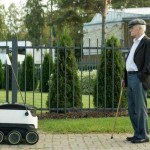 Whilst Amazon have garnered much of the publicity in terms of drone based deliveries, there has been an equally interesting progression in ground based delivery systems.
Whilst Amazon have garnered much of the publicity in terms of drone based deliveries, there has been an equally interesting progression in ground based delivery systems.
Leading the pack is the device developed by Starship Technologies that started making waves last year. The company hope to automate the last mile delivery process, and their robots are designed to navigate the streets at up to 4mph to its destination.
Interestingly, the team claim that the robot is primarily autonomous, and is therefore capable of safely navigating the congested environs of your average pavement without harming pedestrians.
Indeed, human operators are only called into action in difficult situations and to communicate with pedestrians.
The robot’s ‘cargo hold’ is fitted with a lock to prevent theft of its contents, and an app is used to allow customers to track progress and then unlock the cargo when it arrives at its destination.
Early days
The company has already engaged in a number of trials around the world, the latest of which is with Swiss Post, the national postal service in Switzerland.
The delivery company are partnering with a number of companies in the food and healthcare industry to utilize Starship Technologies to deliver packages to customers.
The partnership, which begins in September, will put the technology through its paces, with the aim to expand operations into other areas if it proves successful.
“The addition of Swiss Post to our testing programme is an exciting development for Starship Technologies,” Starship COO Allan Martinson says. “Not only do we extend robotic delivery to Switzerland, but for the first time anywhere in the world, patients will be able to get medicines delivered to their homes using our on-demand robots. The convenience, and quick nature of robotic delivery will prove invaluable to people in need, who may not be physically able to travel to the pharmacy.”
The partnership is the latest in a long line of deals that have seen the Starship devices travel over 10,000km in 12 countries around the world, all without experiencing any incidents.
Rapid progress
Such machines are increasingly capable of navigating safely, as demonstrated by a team of Stanford researchers, who recently developed their own device, called JackRabbot.
The researchers have developed a computer-vision algorithm that is capable of predicting how people behave on a busy pavement. The robot comes complete with an algorithm that has been trained using machine learning based upon a large number of videos showing people moving around busy streets and other public spaces.
When they tested the performance, it emerged that the algorithm out-performed a number of existing methods of predicting how humans will move.
The robot comes complete with a number of cameras and sensors and is being tested in a range of environments to try and replicate a real world use-case.
We have already seen companies such as Dominos test out this kind of robot for delivering pizzas, whilst Geneva airport has been testing out a similar machine, called LEO, for managing the baggage of travelers.
It’s a fascinating area that is well worth keeping an eye on.
Very interesting indeed.